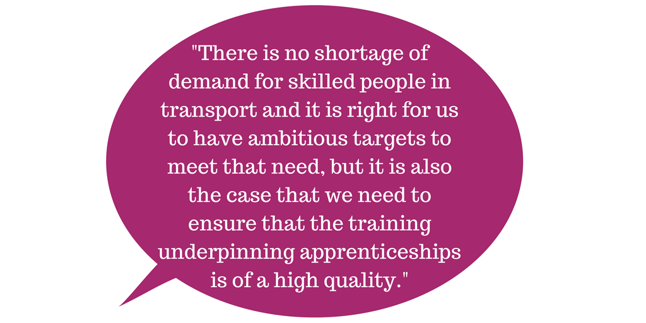The IG Central and Local Government Hub spoke with Mike Brown MVO, Commissioner for Transport for London, and asked him a few questions on the closing the skills gap within the UK transport sector.

In response to the growing skills gap, the government established the Strategic Transport Apprentice Taskforce with the aim of creating 30,000 apprenticeships in transport by 2020. Do you believe we are on course to achieve this target?
"Since I took over as Chair of STAT in late 2016, I’ve been impressed with the drive and commitment in the transport sector to bring more people into this industry.
As Chair, I have expanded STAT beyond road and rail to ensure that we are working collaboratively to bring more apprentices into all areas of our industry – airports, maritime, freight, logistics and ports. I was very pleased to announce the 2,000 apprenticeships created in our sector last year, and I am looking forward to reporting back on further progress later this year.
There is no shortage of demand for skilled people in transport and it is right for us to have ambitious targets to meet that need, but it is also the case that we need to ensure that the training underpinning apprenticeships is of a high quality, that it addresses the skills needs we have in the future, and really seizes the opportunity to bring underrepresented groups into our workforce.
We need ambitious and stretching targets. There is a whole series of measures in place to address the skills gap and they are already delivering some results – including the 2,000 new apprenticeships in road and rail last year. Forecasts show a steep growth in the coming years and early indications are that we are making good so far in 2018.
I am confident the efforts being made right across our sector will help enormously in bringing in the numbers of skilled people we need in transport. But, we cannot afford to lose focus and drive."
With the Infrastructure Sector potentially facing up to 700,000 workers who are set to retire in the next 10 years, just how important is it that organisations like TfL work with Further Education Institutions to attract young people into the sector?
"Working with Further Education Institutions is essential, not just in attracting young people to the sector but in supporting skills development and re-skilling.
Our School Skills and Early Careers recruitment programmes include activities designed specifically to include FE students. For example, our schools challenge: Innovate TfL in association with Cleshar, is open to Year 12 and 13 students and has had FE representation at the last two finals. Much has also been written about the need to encourage children from much younger ages – in Primary Schools - to think about jobs in STEM, to help challenge negative stereotypes that exist about gender job roles and the type of work STEM jobs can involve. I look forward to supporting efforts in the wider sector in increasing our outreach to education providers at all stages of education."
What do you believe are the major challenges that the transport sector need to overcome to ensure the industry continues to attract the correct candidates?
"There are three challenges. The underrepresentation in Science, Technology, Engineering and Mathematics (STEM) disciplines, perceptions about what we do and promoting the available career options in the sector.
I have a clear ambition for TfL to be representative of the city we serve. A personal mission for me is to encourage people from diverse backgrounds to apply for STEM roles across our industry."
TfL has a successful Supplier Skills programme, partnering with organisations such as Gingerbread and Women into Construction. How much do you think the perception of the infrastructure and transport industry needs to change to better attract women into the industry?
"Our partnership with Women into Construction and the charity Gingerbread to encourage more women into the transport industry has been hugely positive. All 16 women who started the programme completed it, and, to date, 12 women have found employment as a result of the skills and experience they gained on the scheme.
These programmes can be extremely effective as they offer women, considering jobs in the transport sector, the opportunity to see other women successfully undertaking those roles. This means that they are more likely to apply for similar positions and encourage others.
2018 marks the Year of Engineering. This is a fantastic opportunity to showcase engineering in our industry and 100 years of the start of women’s suffrage gives us another opportunity to celebrate the incredible contribution women have made at TfL. This builds on the legacy of our 100 years of women in transport campaign which started in 2014."
Finally, as Commissioner of TfL what will your main priorities, especially in regards to skills and staff development, be over the next few years?
"As Commissioner I want TfL to have a workforce that is as diverse as the city we serve. We must create the right opportunities for our people to develop their skills by offering a diverse range of apprenticeships. We need to continue to focus on creating entry level opportunities through the apprenticeship route. Finally we should be celebrating and showcasing our engineering excellence to reveal the breadth of jobs right across our sector and inspire more people to select transport as a career."
